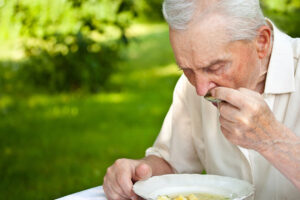 Drooling, or sialorrhea, is the unintentional flow of saliva from the mouth. While it’s common in infants, it can also affect seniors, often signaling an underlying health issue. Drooling in the elderly can be both uncomfortable and embarrassing, but understanding its causes and treatments can improve their quality of life.
Drooling, or sialorrhea, is the unintentional flow of saliva from the mouth. While it’s common in infants, it can also affect seniors, often signaling an underlying health issue. Drooling in the elderly can be both uncomfortable and embarrassing, but understanding its causes and treatments can improve their quality of life.
Symptoms of Drooling
Drooling is easy to recognize, as it involves excess saliva escaping the mouth, particularly during eating, speaking, or sleeping. Other symptoms may include:
- Chapped lips or skin irritation around the mouth
- Bad breath
- Difficulty swallowing (dysphagia)
- Excessive saliva production
- Wet pillowcases from nighttime drooling
What Causes Drooling?
Several factors can lead to drooling in seniors, including:
- Neurological conditions: Diseases such as Parkinson’s disease, stroke, ALS, or multiple sclerosis can impair muscle control, leading to difficulty swallowing or keeping the mouth closed, which causes drooling.
- Medications: Certain medications, especially those used to treat psychiatric conditions or allergies, can increase saliva production or reduce muscle tone in the mouth.
- Poor oral motor control: Loss of muscle strength in the face, tongue, or throat, common in older adults, can make it harder to control saliva.
- Dental issues: Poorly fitted dentures or missing teeth can cause difficulty in swallowing and managing saliva, leading to drooling.
- Sinus and throat infections: These conditions can temporarily increase saliva production, contributing to drooling.
How is Drooling Treated?
Treatment for drooling depends on its underlying cause:
- Speech or physical therapy: Exercises can improve swallowing and muscle control, helping manage saliva more effectively.
- Medication: Doctors may prescribe anticholinergic medications to reduce saliva production or Botox injections to temporarily paralyze salivary glands.
- Dental treatments: Addressing poorly fitted dentures or other dental issues may help reduce drooling.
- Surgical options: In extreme cases, surgery to remove or reposition the salivary glands may be considered.
What is the Outlook for Drooling?
With the proper diagnosis and treatment, drooling can often be managed or significantly reduced. Early intervention can improve a senior’s comfort, confidence, and overall quality of life.
If drooling is affecting your loved one’s day-to-day life, seeking medical advice is key to finding effective treatments. A doctor can help pinpoint the underlying cause and recommend the best treatment options.
